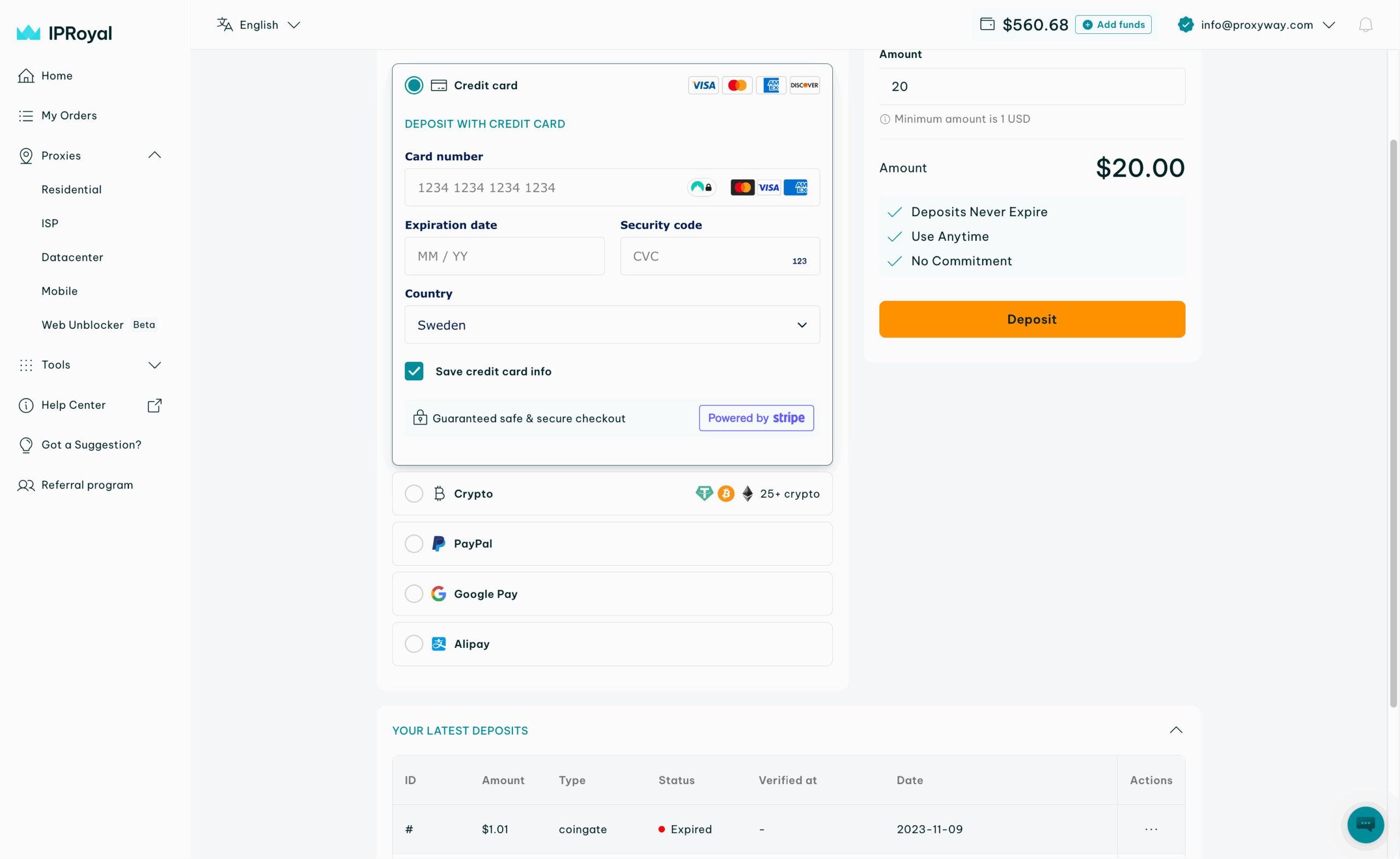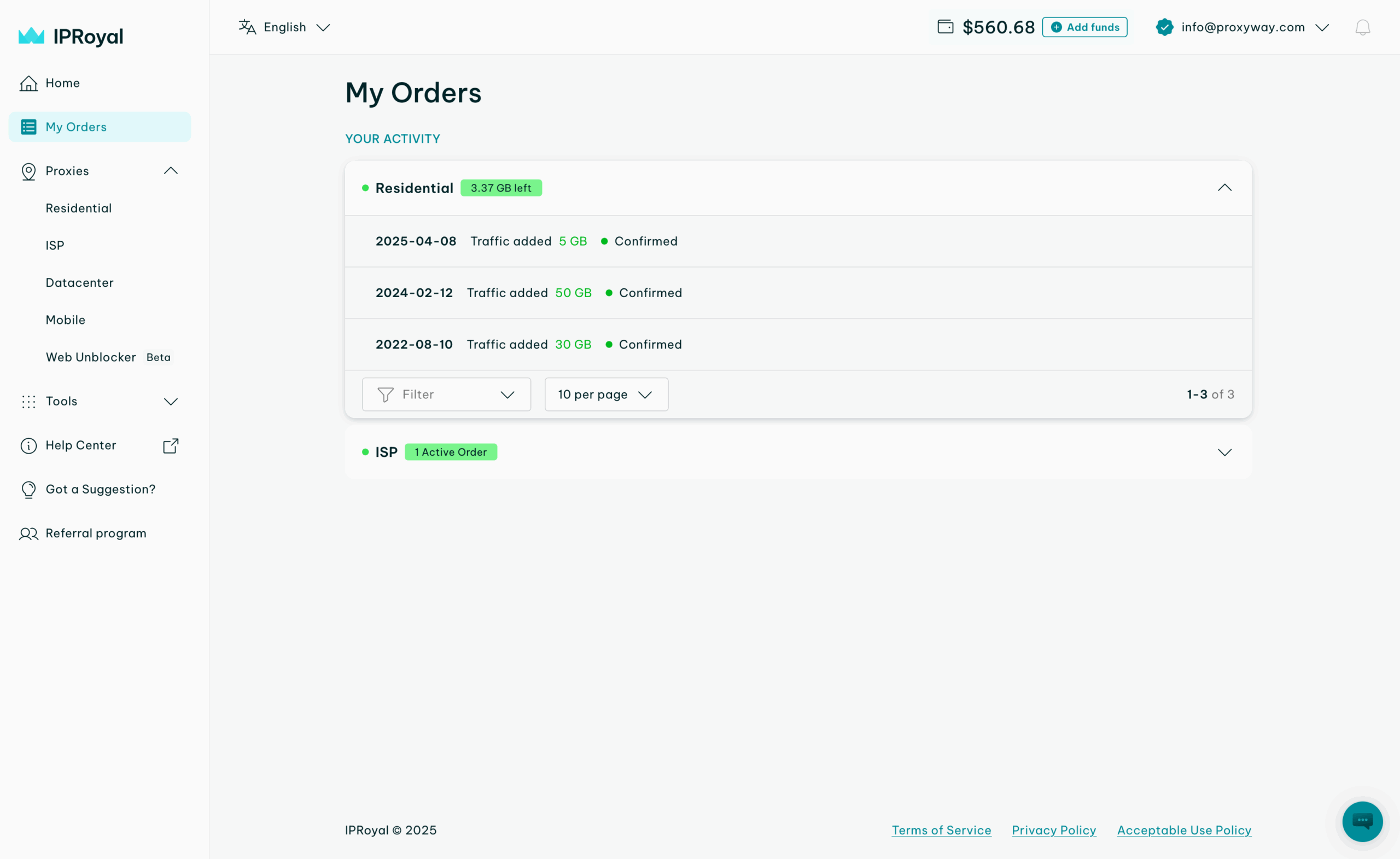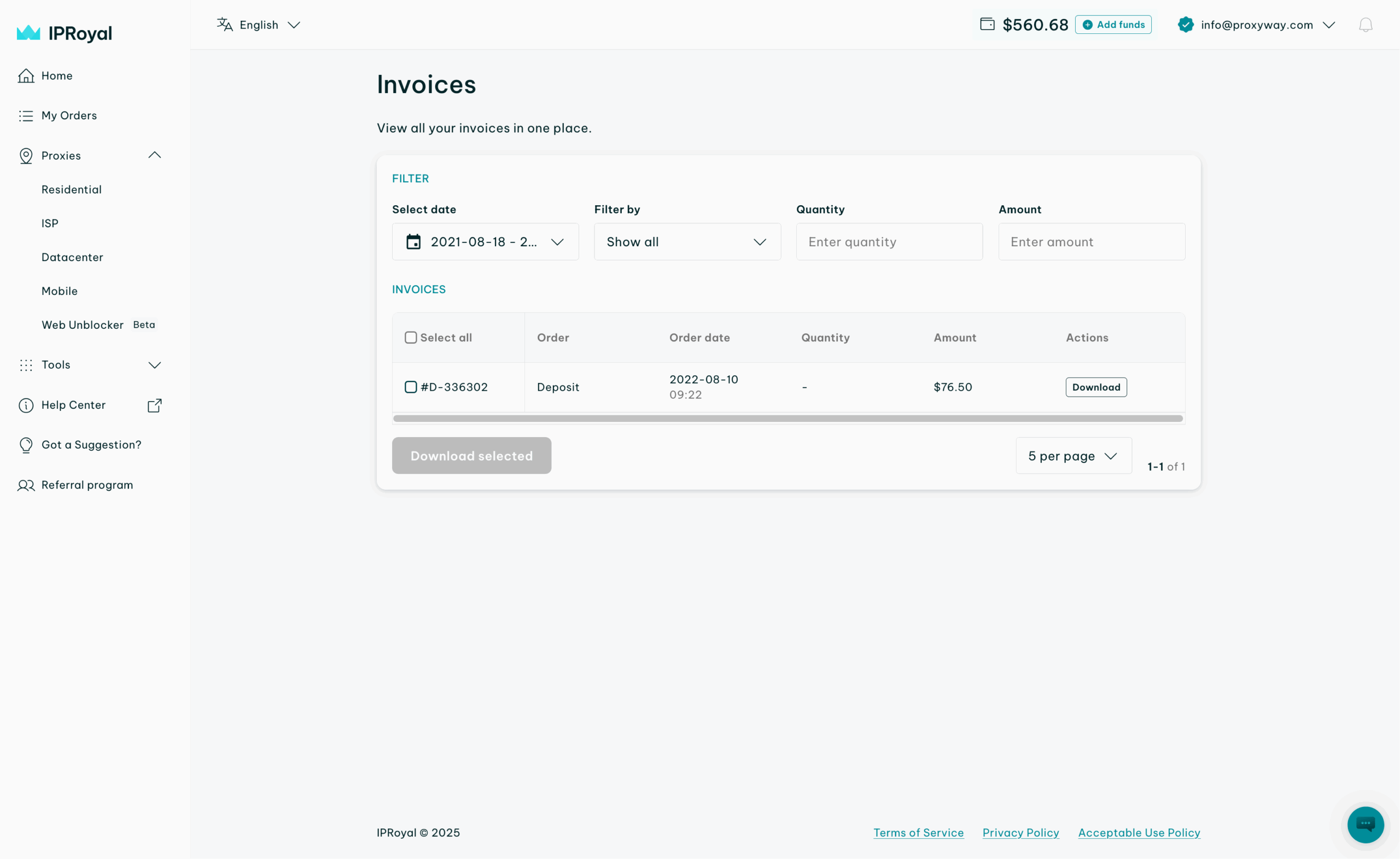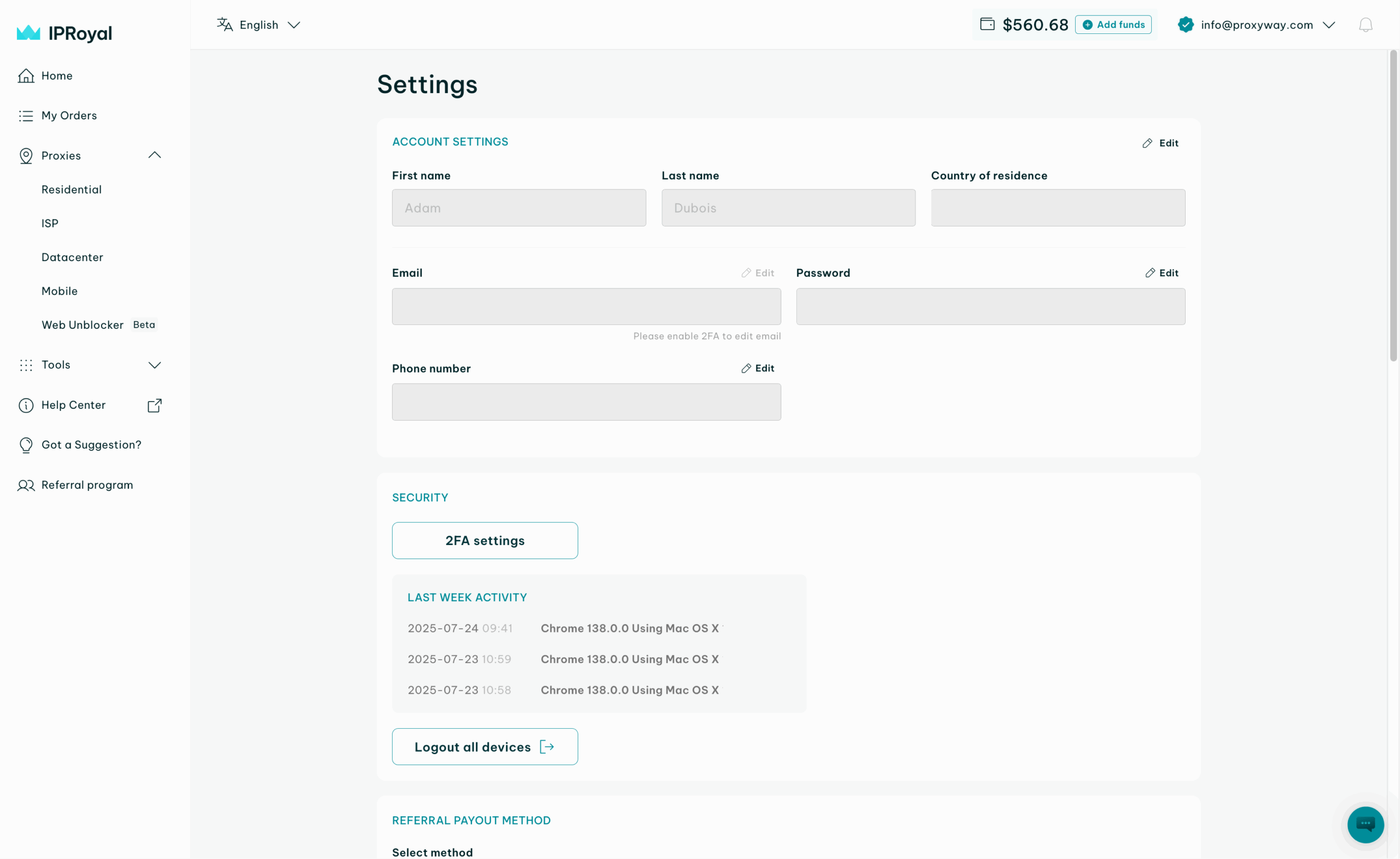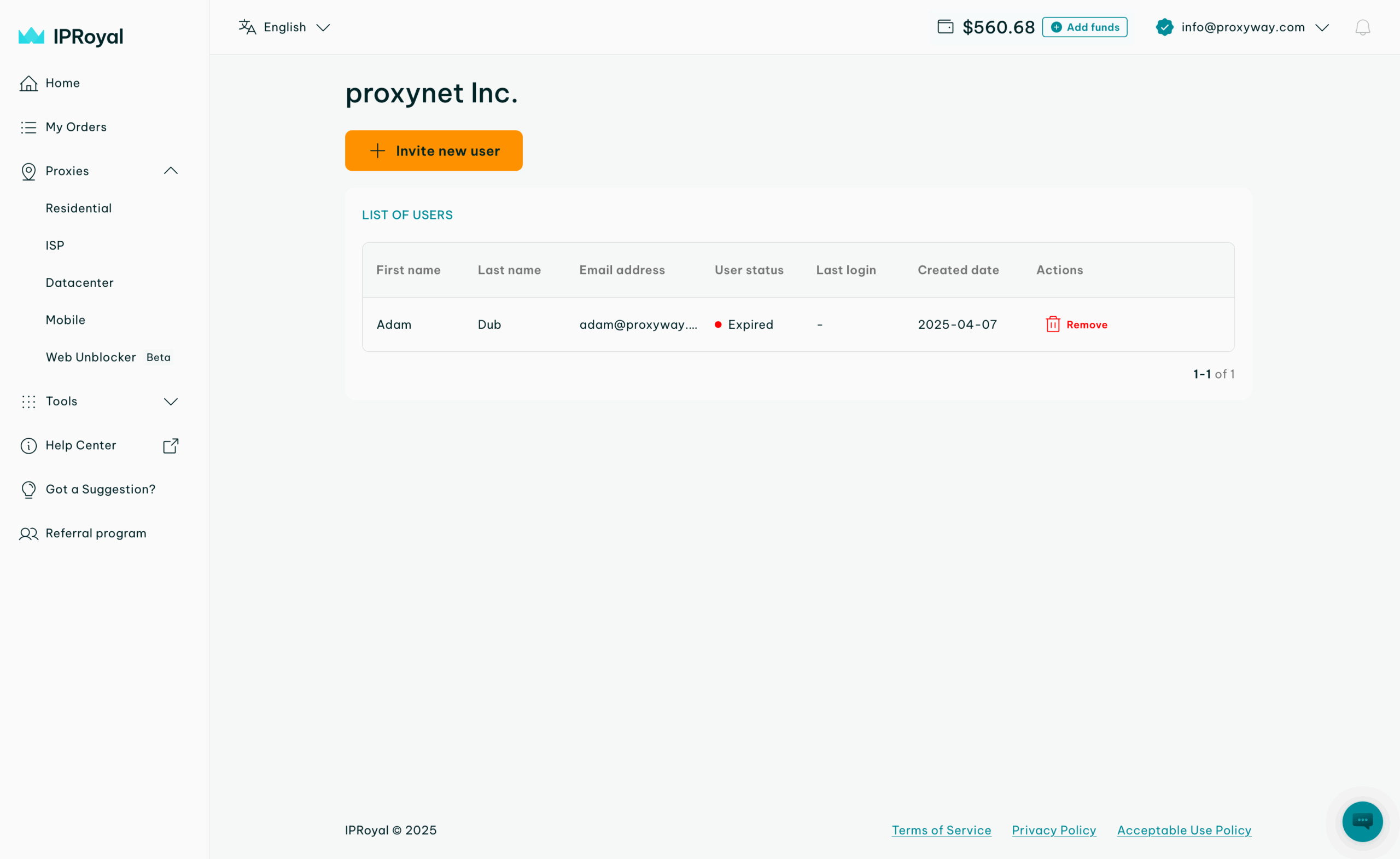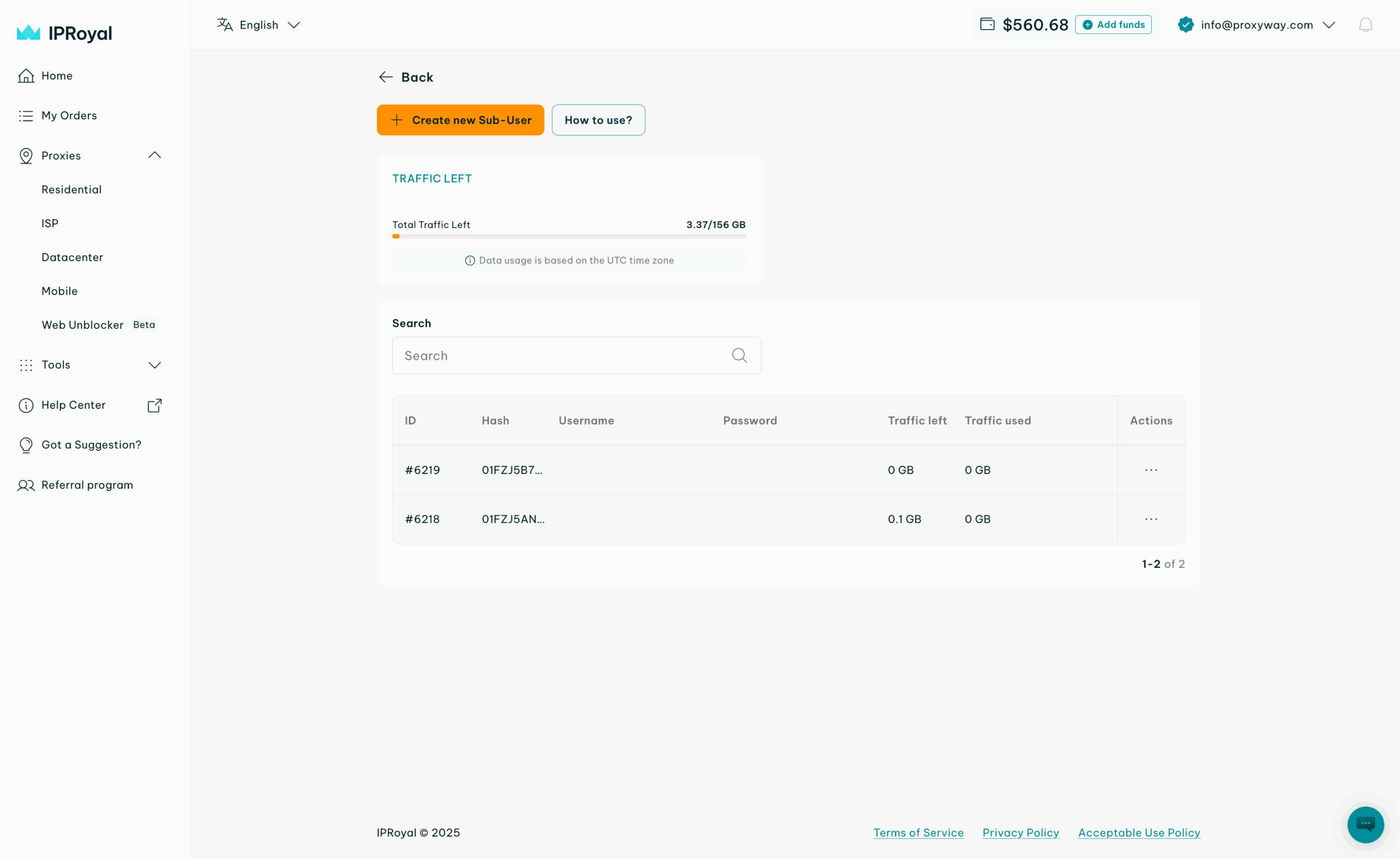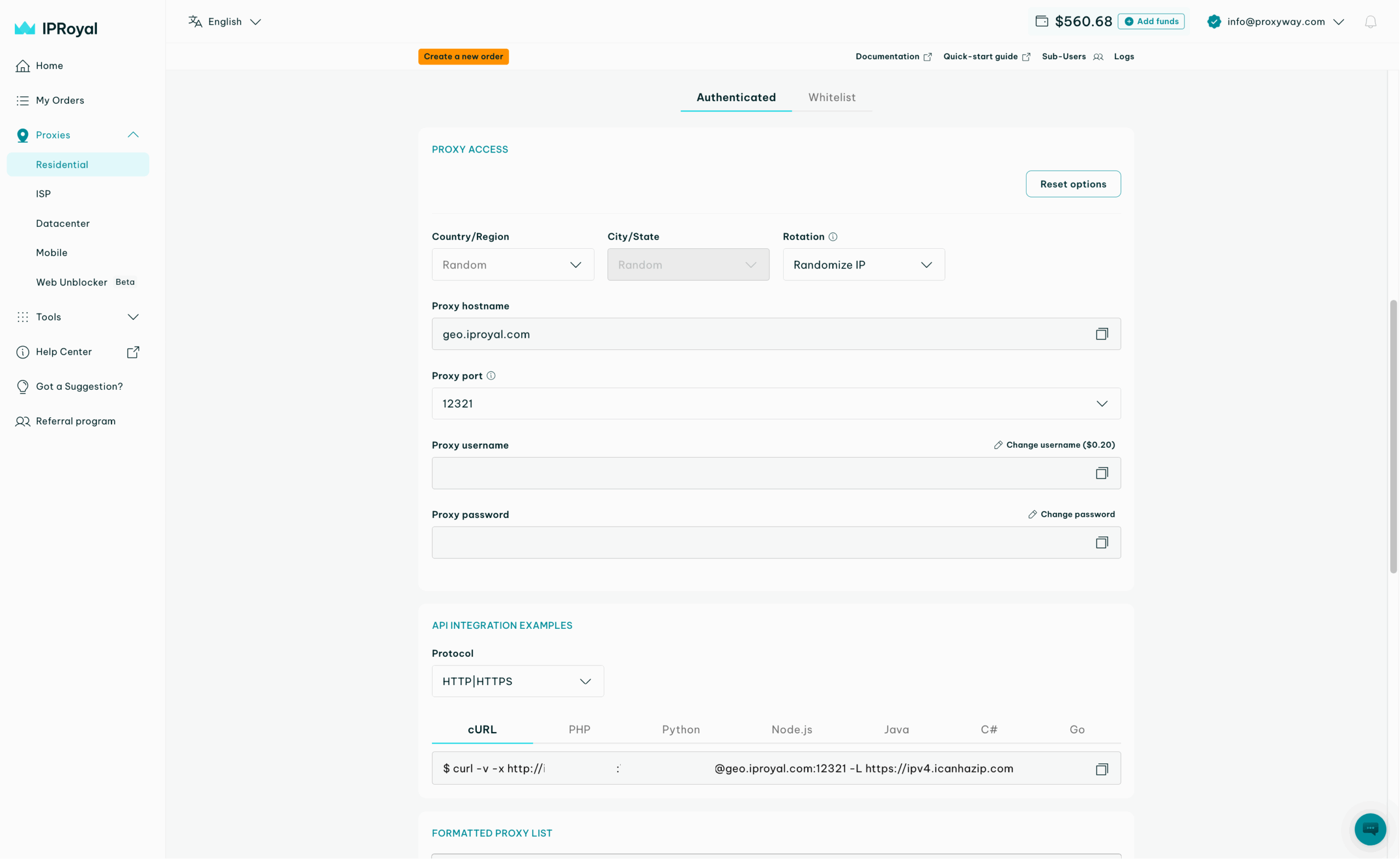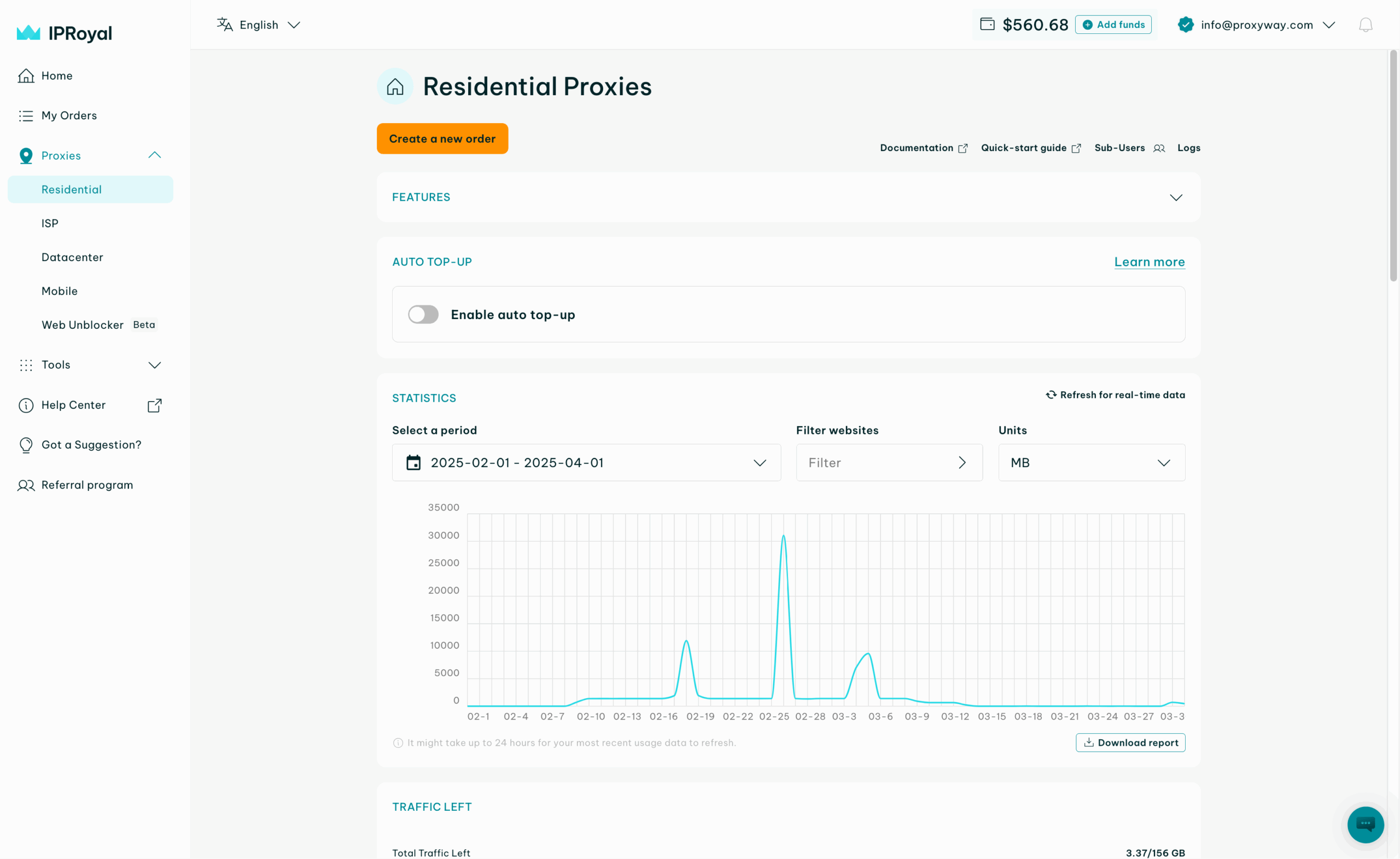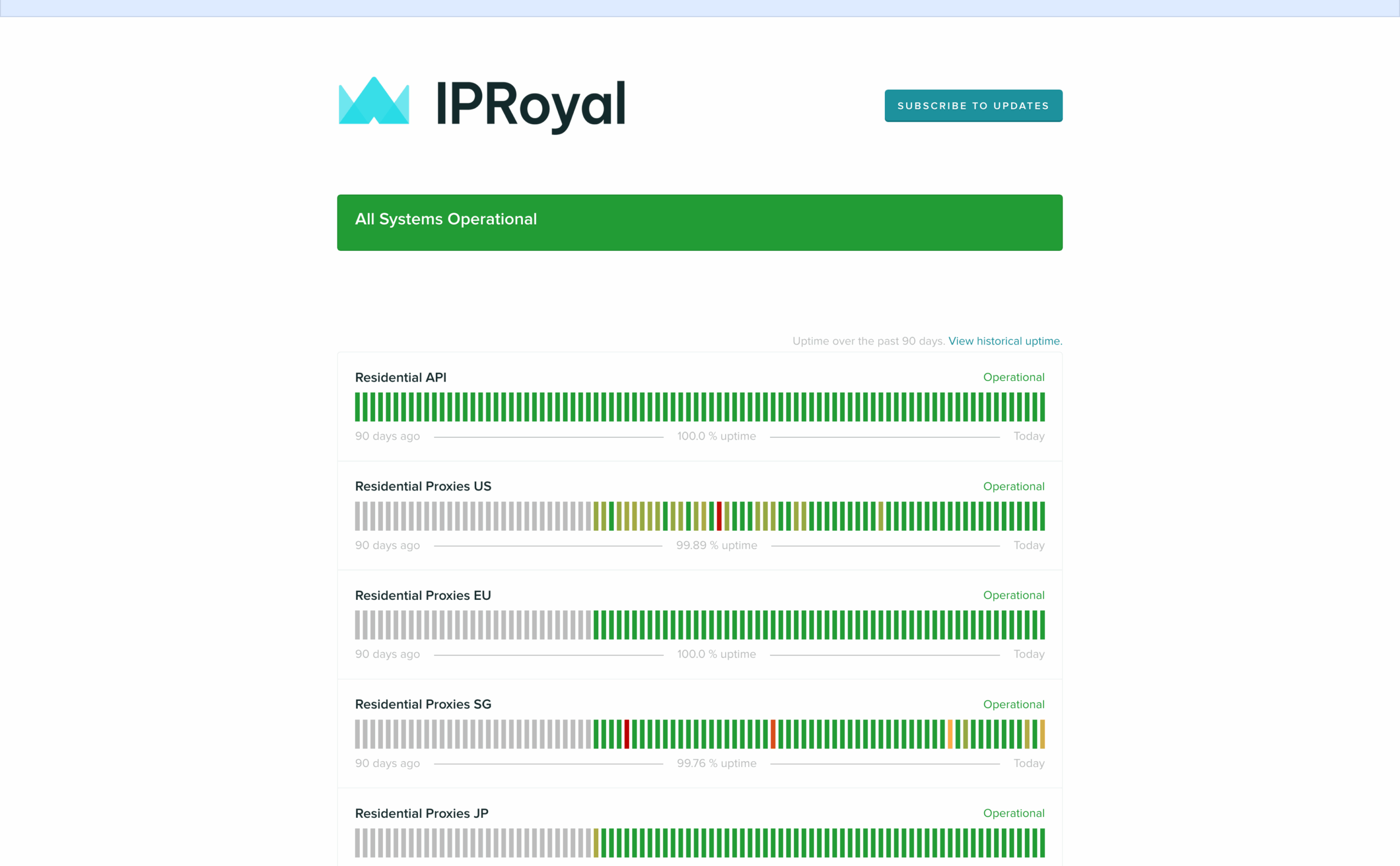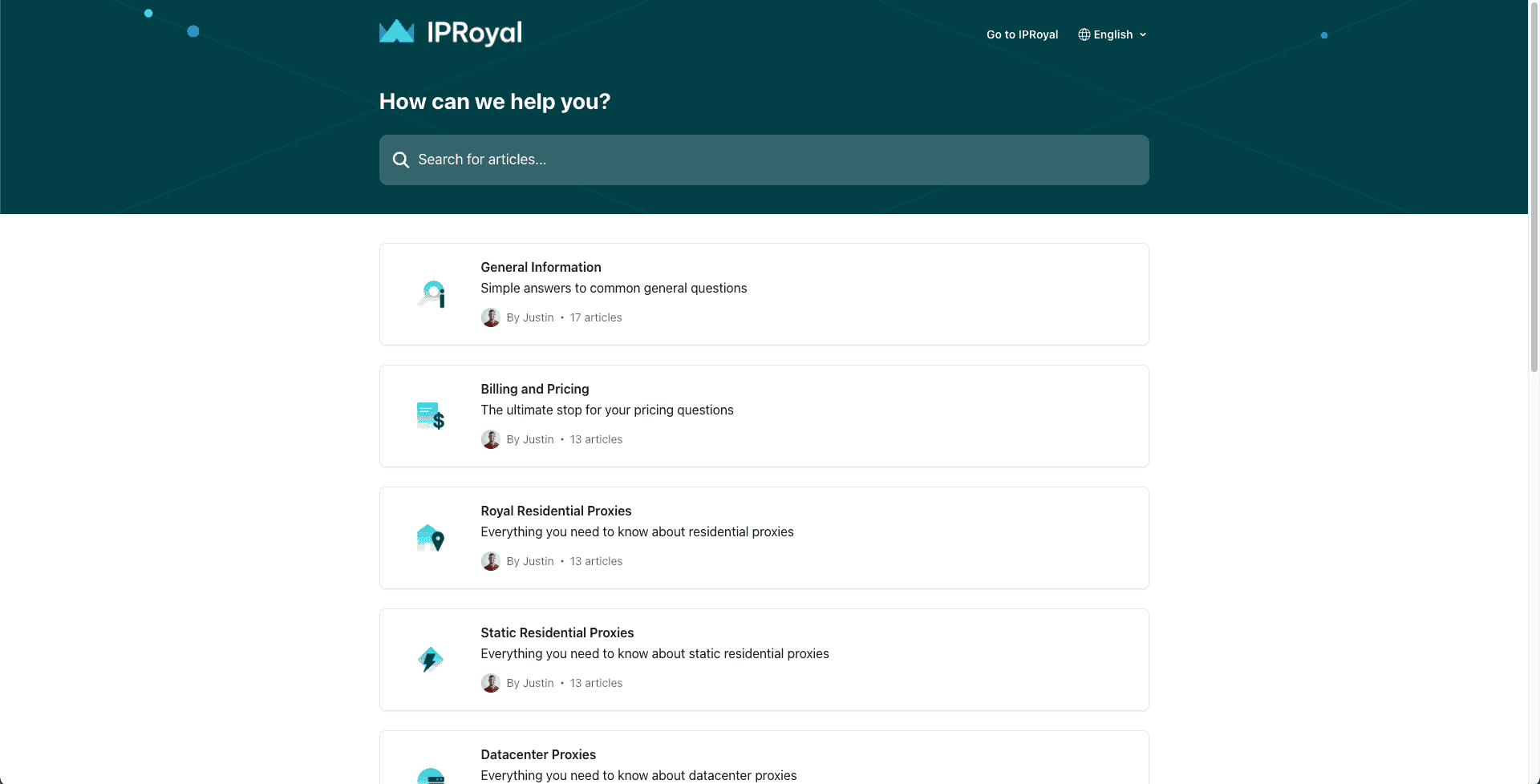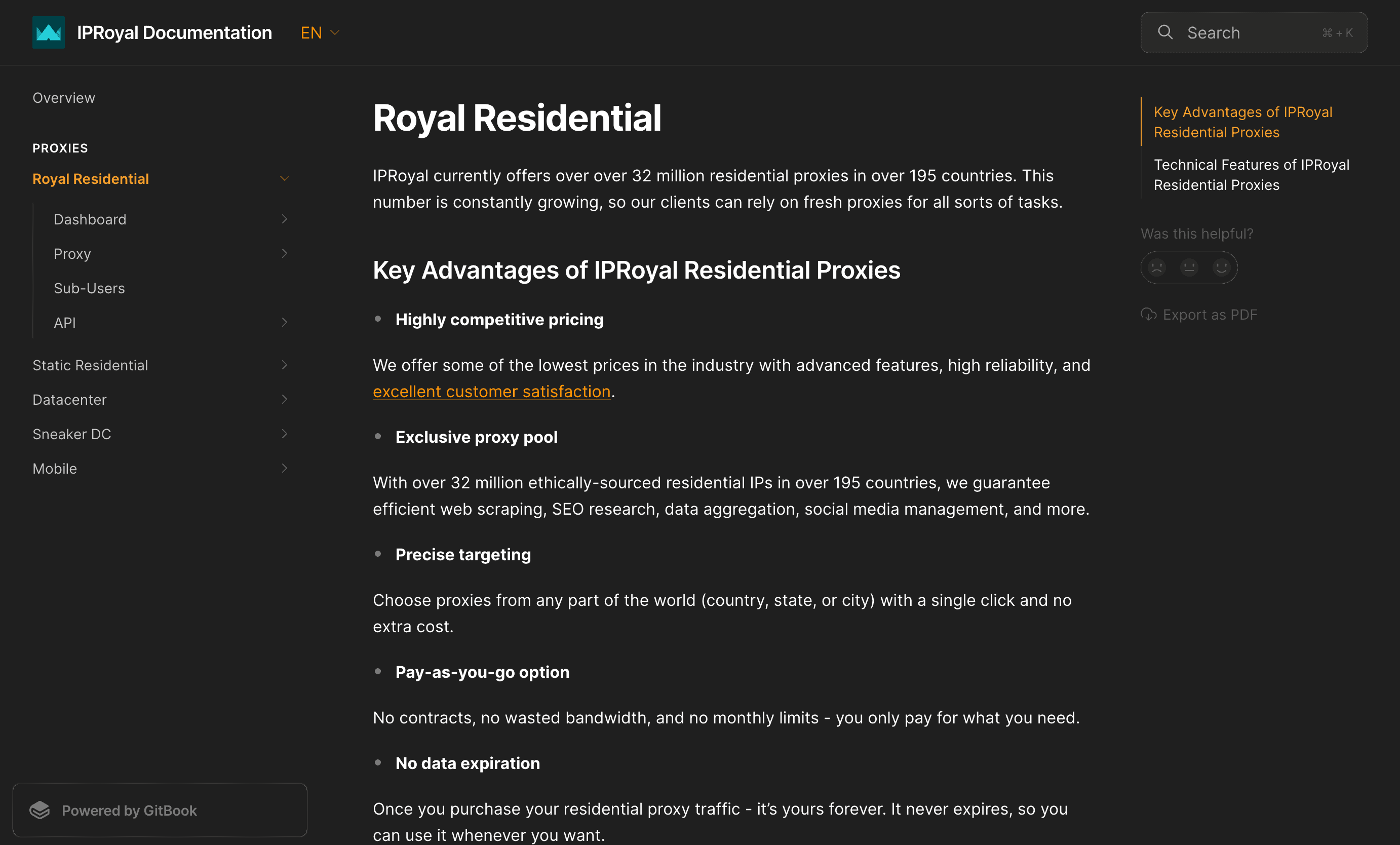
IPRoyal Review
IPRoyal can’t really compete with the leading proxy providers in pool size or quality. But it offers all proxy types in very accessible packages.
Use the code PROXYWAY30 to get a 30% discount.
IPRoyal offers a wide variety of products for social media managers, web scrapers, and various other hustlers on a budget. You can buy just one IP, rent proxies for a week, or get traffic that never expires. The prices have become a hit-or-miss, but IPRoyal’s flexibility is undeniable.
But there are always compromises. What will IPRoyal’s be? And will its products pack enough punch to justify the provider over Decodo, DataImpulse, or even premium competitors like Bright Data? Let’s find out.
If you’ve come from Google, you may be interested in IPRoyal’s Pawns.app. We compare it with similar services here.
News about IPRoyal
-
By Adam Dubois
- Provider News
-
By Adam Dubois
- Provider News
-
By Adam Dubois
- Provider News
General Information
- Country: Lithuania
- Founded: 2020
- Employees (LinkedIn): 50-100
- Proxy networks: Datacenter, ISP, residential, mobile
- Web scrapers: Proxy API for general unblocking
- Supporting tools: Proxy checker, browser extension
- Price range: Mid-market
- Starting price: $1.53
- Payment methods: Credit card, PayPal, crypto, Apple Pay, Google Pay, AliPay
- Trial: 24-hour refund for some products
IPRoyal started out in late 2020. It initially focused on renting IP space to other companies, but the attention quickly shifted to selling proxies directly to customers. Today, the provider offers four different proxy networks that cover all IP types.
IPRoyal runs its own residential proxy pool via a bandwidth-sharing app called Pawns. In a few years, the provider has managed to grow the network to several million IPs. This is an impressive feat, and it also lets IPRoyal claim that the proxies are sourced ethically.
IPRoyal used to be among the most affordable services, in line with Storm Proxies and PacketStream. It also put much focus on sneakerheads, with special datacenter plans and residential proxy endpoints for stores like Nike.
After a price hike in 2022, IPRoyal nears closer to mid-range providers like Decodo. Still, small users remain the company’s main audience, even if it wouldn’t mind selling you terabytes of residential traffic for a large project or reselling. In fact, the provider has been inching upmarket every year, giving up entry-level customers to its daughter project MarsProxies.
According to the CEO Karolis Toleikis, IPRoyal’s ambition is to grow into a top three provider in the near future. Considering that it now employs nearly 100 people and increased the year-over-year revenue by 50% in 2024, the company is on the right track.
IPRoyal Proxy Networks
IPRoyal sells all four main types of proxy servers:
- Datacenter proxies with over 60 locations that come in dedicated lists.
- ISP proxies in the same format and over 30 countries to choose from.
- Residential proxies with global coverage.
- Mobile proxies based on dedicated dongles and available in over 15 countries.
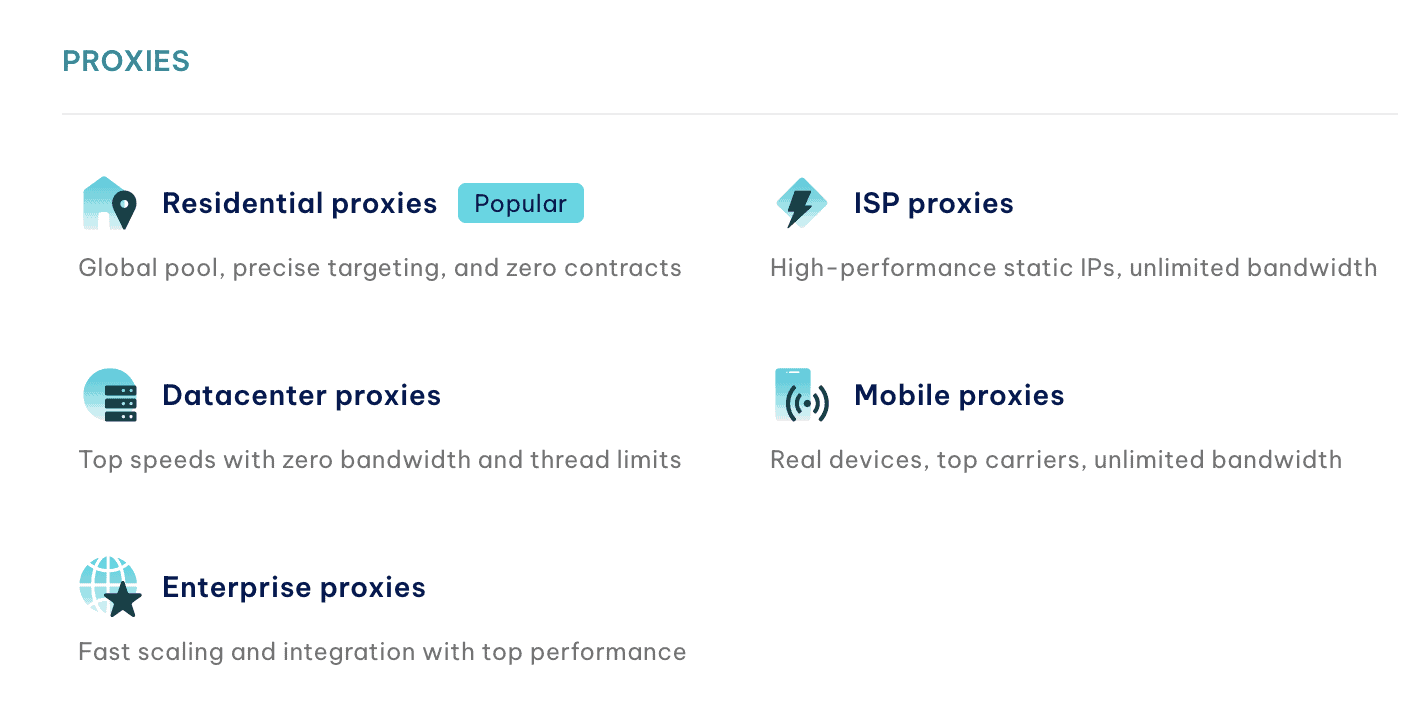
We explore individual proxy types in the expandable drop-downs below:
Residential
Residential proxies are IPRoyal’s flagship product and main growth driver.
🌎 Pool Size & Coverage
- Advertised pool size: 32 million
- Locations: Global
- Filtering: Global, region, country, state, city, ISP (enterprise customers)
- Non-location filters: High-end pool, skip static IPs, skip IP ranges
Between 2023 and 2024, IPRoyal’s advertised proxy pool changed from 2 million to 32 million IPs, which is quite a jump. Still, it remains below the market average, with providers like Bright Data advertising 150 million proxies and more.
The network covers all countries and offers impressive filtering options. You can choose to get IPs from a region, country, or city. ISP targeting is also available, but the provider has to enable it manually.
In addition, IPRoyal offers extra filters like the ability to only fetch the highest quality IPs or remove static residential proxies. Both options reduce the available pool size. It’s even possible to skip particular IP ranges you don’t like by specifying them on the dashboard.
📋 Features
- Connection method: Gateway address
- Rotation: Every request, sessions up to 7 days, manual rotation
- Protocols: HTTP, HTTPS, SOCKS5 (TCP only)
- Concurrency: Unlimited threads & ports
- Traffic: Plan based
- Authentication: Credentials, IP whitelist
- Sub-users: ✅
- Other: Whitelist/blacklist domains
IPRoyal uses gateway servers to route your requests to residential devices. The provider doesn’t disclose a list of the servers it controls; but, for example, requests from our US computer went through a US gateway, our server in Singapore connected through Singapore, and our German server accessed a German gateway first.
IPRoyal’s rotation options are generous. It’s possible to get a new proxy with every connection request, or you can freely specify a sticky session between one second and seven days. Of course, you’re very unlikely to actually keep the same IP for that long. If need be, you can manually rotate all sessions with a press of a button.
Another useful feature is the ability to blacklist the domains you don’t want to access. This can potentially save traffic. Or, you can go the other way around and only enable the domains you need through a whitelist.
It’s possible to create sub-users for easier team or project management; enabling this feature requires at least $200 spend.
⚙️ Integration Examples
- Basic request: USERNAME:PASSWORD@geo.iproyal.com:12321
- Using filters: USERNAME:PASSWORD_country-dk,it,ie@geo.iproyal.com:12321
- Establishing sessions: USERNAME:PASSWORD[email protected]:12321
- Using IP whitelisting: geo.iproyal.com:11200, 11201…
IPRoyal filters the pool by adding parameters to the password. This way, you can establish sticky sessions, specify a country, etc.
Customers who prefer to authorize by whitelisting an IP can do so using the dashboard widget. It allows setting up filters and then bind this configuration to your IP address, giving you only a hostname and port to use.
IPRoyal enables around 100 ports for IP whitelisting. It’s much better than nothing, but configuring each port separately for sticky sessions can be a pain, and one hundred isn’t a big number.
💵 Pricing Plans
- Model: Scaling PAYG, subscription
- Format: Traffic
- Modifiers/upsells: $200 spend for sub-users & domain blacklisting, $2,000 spend for ISP targeting
- Starting price: $7 for 1 GB
- Trial: ❌
IPRoyal uses a pay-as-you-go based pricing model for its residential proxies. You can buy any number of gigabytes you wish, and they’ll stay there until used. Getting more traffic gives an increasing discount (an order of 2 GB costs 15% less/GB). So, it makes sense to buy as much as you need in one go to save money.
IPRoyal also introduced subscriptions in 2025. They give an extra 5% discount and unlock other bonuses: VIP support and access to the high-end pool. Subscription traffic rolls over.
To keep your tasks going, IPRoyal gives the option to automatically top up traffic. You can choose the threshold, amount, and where the money comes from: the dashboard wallet or your bank account.
Compared to premium and most mid-range competitors, IPRoyal’s prices are affordable – but only if you can get a fat discount coupon. In general, IPRoyal scales well and encourages bulk purchases, providing rates for up to 10 TB of data.
📊 Performance Benchmarks
We last tested IPRoyal’s residential proxies in April 2025, for the annual Proxy Market Research.
#1: Pool size & composition
| Gateway | Parameters | Unique IPs | Residential %* |
| Global | 1.2M req, 21 days | 535,859 | 99.28% |
| US | 560k req, 14 days | 159,575 | 99.75% |
| UK | 560k req, 14 days | 59,930 | 99.81% |
| EU** | 1.2M req, 14 days | 153,557 | 99.79% |
| Brazil | 560k req, 14 days | 164,221 | 98.19% |
| India | 560k req, 14 days | 235,408 | 99.81% |
| Australia | 140k req, 7 days | 6,100 | 99.46% |
* IP2Location database, Usage type data point, ISP, ISP/MOB, MOB IPs.
** Combines Germany, France, Spain, Italy, the Netherlands.
Comparison with other providers
While not large, IPRoyal’s proxy network had a respectable number of IPs in major locations. Furthermore, an IP database identified most of the proxies as coming from landline or mobile connections.
While it has notably grown compared to 2024, in the context of other providers, IPRoyal’s residential network was still among the smallest in size.
Infrastructure performance
Requests: Same as the pool test (140k to 1.2M per gateway)
Target: Nearest server of a global CDN (~6 KB response size)
| Gateway | Our server location | Avg. success rate | Avg. response time |
| Global | DE | 99.56% | 1.06 s |
| US | US | 99.43% | 1.01 s |
| UK | DE | 99.46% | 0.48 s |
| EU | DE | 99.20% | 0.52 s |
| Brazil | US | 99.48% | 1.57 s |
| India | SG | 98.97% | 1.45 s |
| Australia | SG | 99.87% | 1.04 s |
Comparison with other providers
IPRoyal had a high success rate, even considering how high the baseline has become. Looking at individual country pools, the infrastructure barely failed in countries like the US or Brazil. This marks a notable improvement over 2023’s and 2024’s results.
IPRoyal has also notably improved in connection latency: while still lagging behind the speed kings, its proxies can stand on their own.
Response time with a 2 MB page
Requests: 15,000 with the Global gateway, 5,000 with the US gateway
Target: Nearest server of a global CDN
| Gateway | Our server location | Avg. response time |
| Global | DE | 7.00 s |
| US | US | 1.56 s |
Comparison with other providers
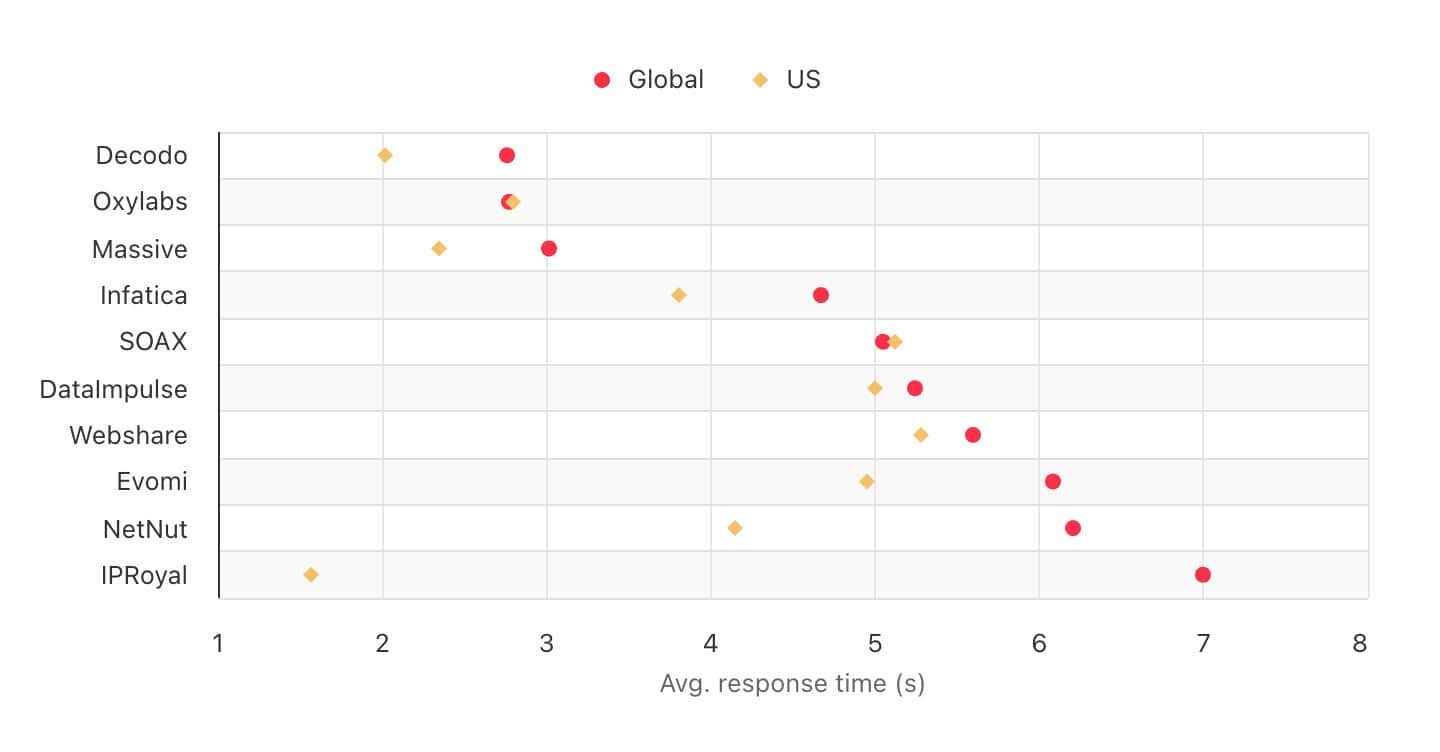
When testing IPRoyal with larger page sizes, we saw two extremes. Its residential proxy network was the slowest to connect from random locations and the fastest in the US. Go figure.
Performance with popular targets
Requests: ~2,600 per target
Location: US (both the gateway and our server)
| Avg. success rate | Avg. response time | |
| Amazon | 82.70% | 3.71 s |
| 66.77% | 5.97 s | |
| 74.42% | 4.60 s | |
| Total | 74.63% | 4.76 s |
Comparison with other providers
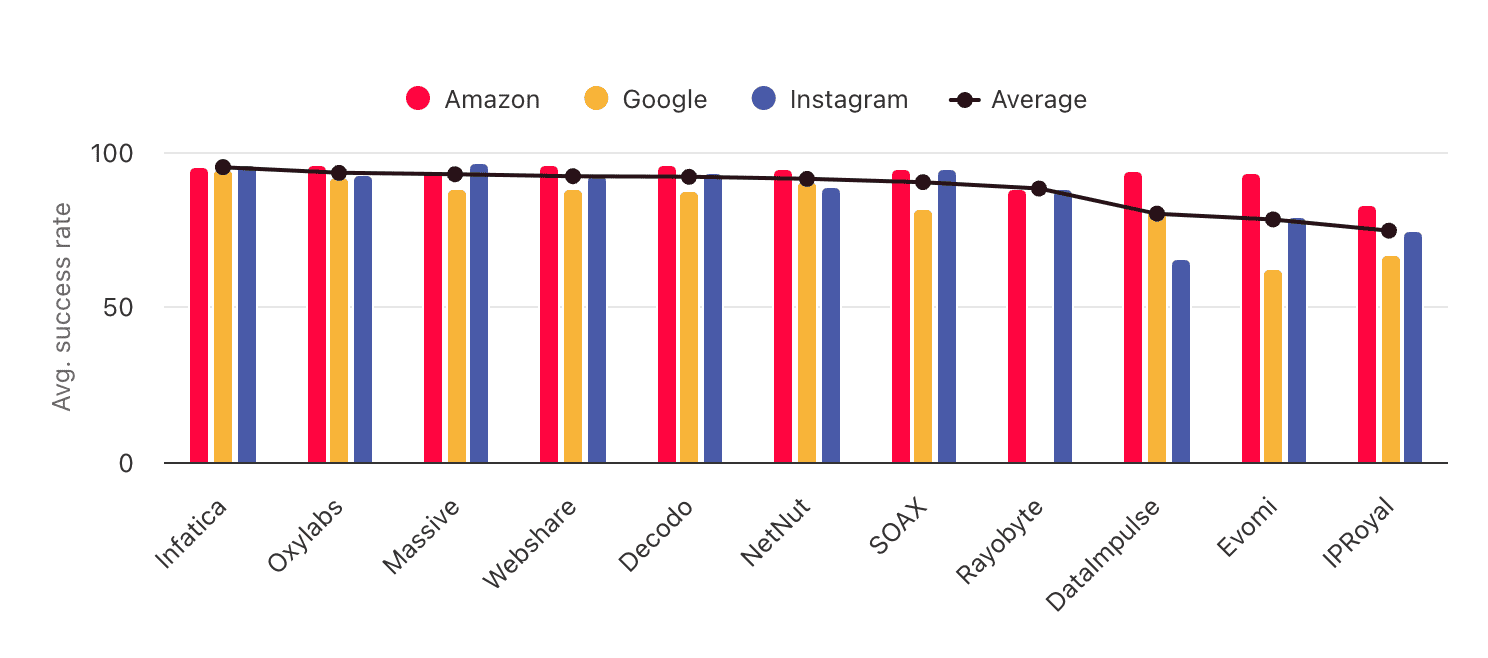
IPRoyal struggled with popular targets, suggesting that its proxies experience more abuse due to their popularity and relatively small pool.
Datacenter & ISP (Static Residential)
IPRoyal sells datacenter and ISP proxies in static lists available only to you. The provider also used to offer sneaker-optimized servers but discontinued the product after the market died down.
🌎 Pool Size & Coverage
- Pool size: Based on purchased IPs (500k ISP proxies in total, DC not specified)
- Locations (July 2025)
- Datacenter: 63 in six continents
- ISP: 33 in five continents
- Targeting: Country, state, city
- Distribution: Free choice of locations during purchase
- Subnets: Random distribution
- Replacement: Monthly free
IPRoyal’s proxies cover a lot of ground, especially the datacenter variety. Of course, not every country is always in stock; but when we last checked, most were available and had at least 50 IPs.
IPRoyal had the best coverage in Europe, though even Africa was relatively well represented with countries like Botswana, Egypt, Namibia, and Zimbabwe.
In addition to country-level targeting, you can go ahead and choose a particular state or city. Don’t expect the variety to be big, though: outside the US, two to three cities are available on average.
📋 Features
- Connection method: Direct (IP:Port)
- Rotation: ❌
- Protocols: HTTP, HTTPS, SOCKS5 (with UDP)
- Traffic: Unlimited
- Concurrency: Unlimited
- Authentication: Credentials, IP whitelist
IPRoyal’s proxies take the format of a simple IP list. They’re pretty much unlimited: you can establish as many threads or send as much traffic as you like. Furthermore, the servers support SOCKS5 traffic, including the UDP protocol.
💵 Pricing Plans
- Model: Subscription (24 hrs, 30, 60, 90 days)
- Format: Pay per IP
- Starting price
- Datacenter: $1.53 for 1 IP
- ISP: $2 for 1 IP & 24 hrs or $4 for 30 days
- Modifiers: IP location, quality, special requirements
- Trial: 24-hour refund
IPRoyal’s proxies use a subscription-based pricing model. You can get a monthly plan, pay every two months (5% off) or three months (10% off). The ISP proxies can be rented out for just one day.
The provider charges for the number of IPs you get. The price can change depending on location: some countries for datacenter proxies cost 15% less. There are also several upsells. For one, you can opt buy only proxies with a low fraud score on Scamalytics or IPQualityScore – this costs 10-15% more. Paying 30% extra lets you enter custom requirements into a text field.
It’s possible to choose any number of proxies you want, starting from one IP. This doesn’t make sense for the ISP proxies, as getting just two IPs cuts the rate to $3/IP. Buying even more decreases the price further, but prices stop improving at 100 IPs. As a result, IPRoyal’s pricing is competitive until 200-300 proxies, but it drops off at scale.
📊 Performance Benchmarks
Basic analysis
| /24 subnets | Location (MaxMind) | Location (IP2Location) | ASNs |
| 100 | US (99%), NC (1%) | US (100%) | AT&T (38%), Crocker (18%), CenturyLink (17%), Internet Holdings LLC (7%), Charter (7%), Frontier (5%), X-DSL Networking (2%), Secured Servers (2%), Windstream (2%), Bunny Communications (2%) |
IPRoyal evidently decided to flex its muscles and gave us proxies from 100 different subnets – very impressive. The majority were associated with large consumer ISPs like AT&T and CenturyLink.
IP quality
Residential percentage: IP2Location database, Usage type data point (ISP, ISP/MOB, MOB IPs)
| Residential % | Matching ASN & organization | Matching ASN & org location |
| 99% | 27% | 60% |
An IP database identified all but one proxies as residential, which is good. One quarter of them had a matching ASN and owner; this is desirable but very hard to achieve with ISP proxies. However, in four cases out of ten, the IP’s owner was located outside of the US.
Infrastructure performance
Requests: 70,000 over 7 days
Target: Nearest server of a global CDN (~6 KB page size)
Our server location: US
| Avg. success rate | Avg. response time |
| 94.75% | 0.46 s |
IPRoyal’s ISP proxies performed rather poorly in our synthetic benchmarks. These proxies are hosted in data centers with great connections, so they shouldn’t fail unless blocked by the target. In addition, they connected relatively slowly – for comparison, Massive’s response time was 0.09 s, or five times faster.
Download speed
Target: Hetzner’s 100 MB Ashburn benchmark
Proxies tested: 10
| Avg. without proxies | Average | Median | Slowest IP |
| 52.93 MB/s | 5.31 MB/s | 6.12 MB/s | 1.37 MB/s |
For dedicated ISP proxies, IPRoyal didn’t have much throughput. While 5 MB/s is enough for rendering full pages, downloading smaller files, and streaming videos, we expected the speed to be in the dozens of megabytes.
Performance with popular targets
Requests: ~2,600 per target
Location: US (both the gateway and our server)
| Avg. success rate | Avg. response time | |
| Amazon | 60.73% | 3.28 s |
| 86.70% | 3.00 s | |
| Total | 73.72% | 3.14 s |
Comparison with other providers
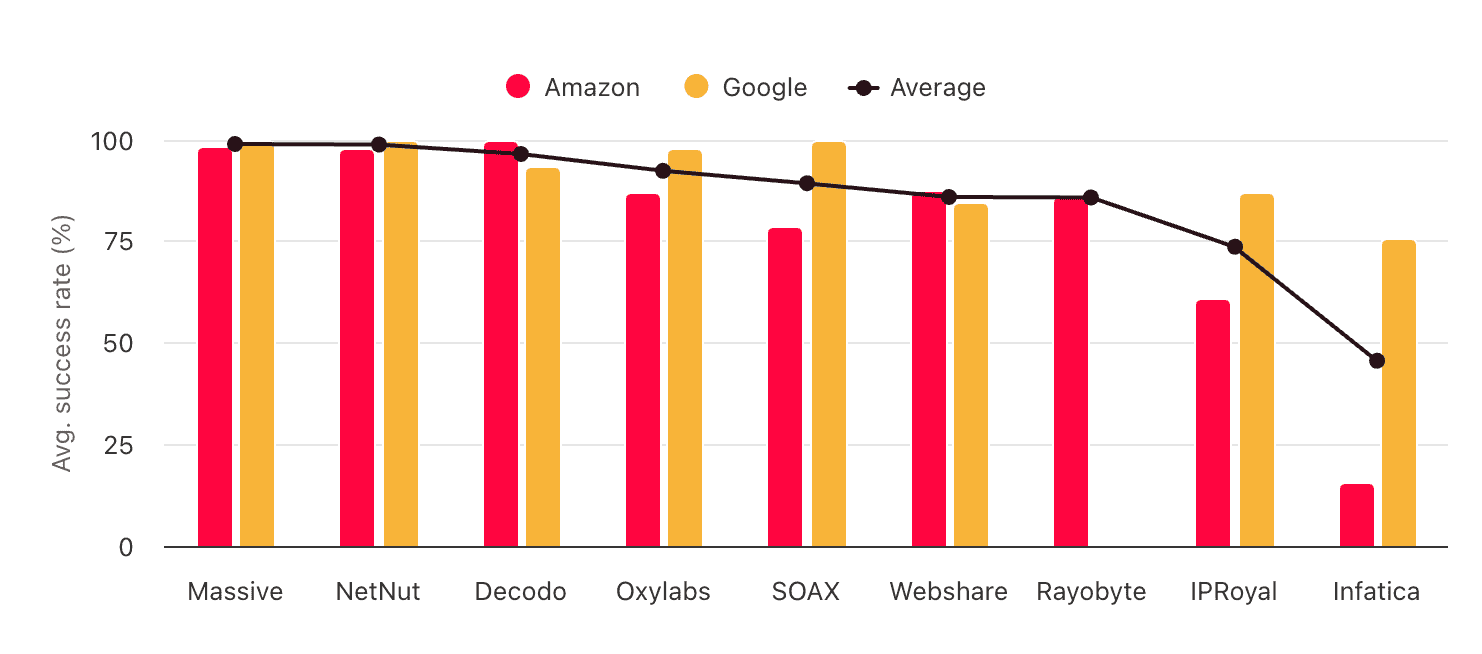
IPRoyal experienced some issues with Amazon, proving that IP variety alone isn’t enough. Other than that, its results were okay.
How to Use IPRoyal
Registration
To start using IPRoyal, you must first fill in a registration form. It requires entering your name, surname, and phone number as personal details, and you might need to confirm the registration via phone. Once done, you get to enter the dashboard, where you can buy and manage access to IPRoyal’s proxy networks.
Alternatively, IPRoyal allows logging in with Google or LinkedIn accounts.
KYC & Usage Policies
With the exception of static residential proxies, KYC isn’t obligatory. But without it your use of proxies will be limited. In the case of residential IPs, you’ll be able to access only 40% of the pool. In addition, IPRoyal will block LinkedIn, several login pages, banks, governmental and other websites.
The identity verification process involves sending an ID to a third-party service called Idenfy.
Dashboard
IPRoyal has a fully-featured dashboard for working with its proxies. It lets you add money, buy a plan, set up proxies, monitor traffic use, contact support, and more. The dashboard is available in English and Chinese, and there’s a dark theme for those who need it.
IPRoyal’s dashboard is divided into self-contained sections for each product. They let you buy proxies, authenticate them, and track use where possible. So, you only need to leave your tab to change the account settings – or deposit money if you opt to use the wallet functionality.
That said, the dashboard is less isolated than it used to be: the Home page lets you toggle usage statistics between different products, and there are pages for all orders and invoices, no matter the proxy type.
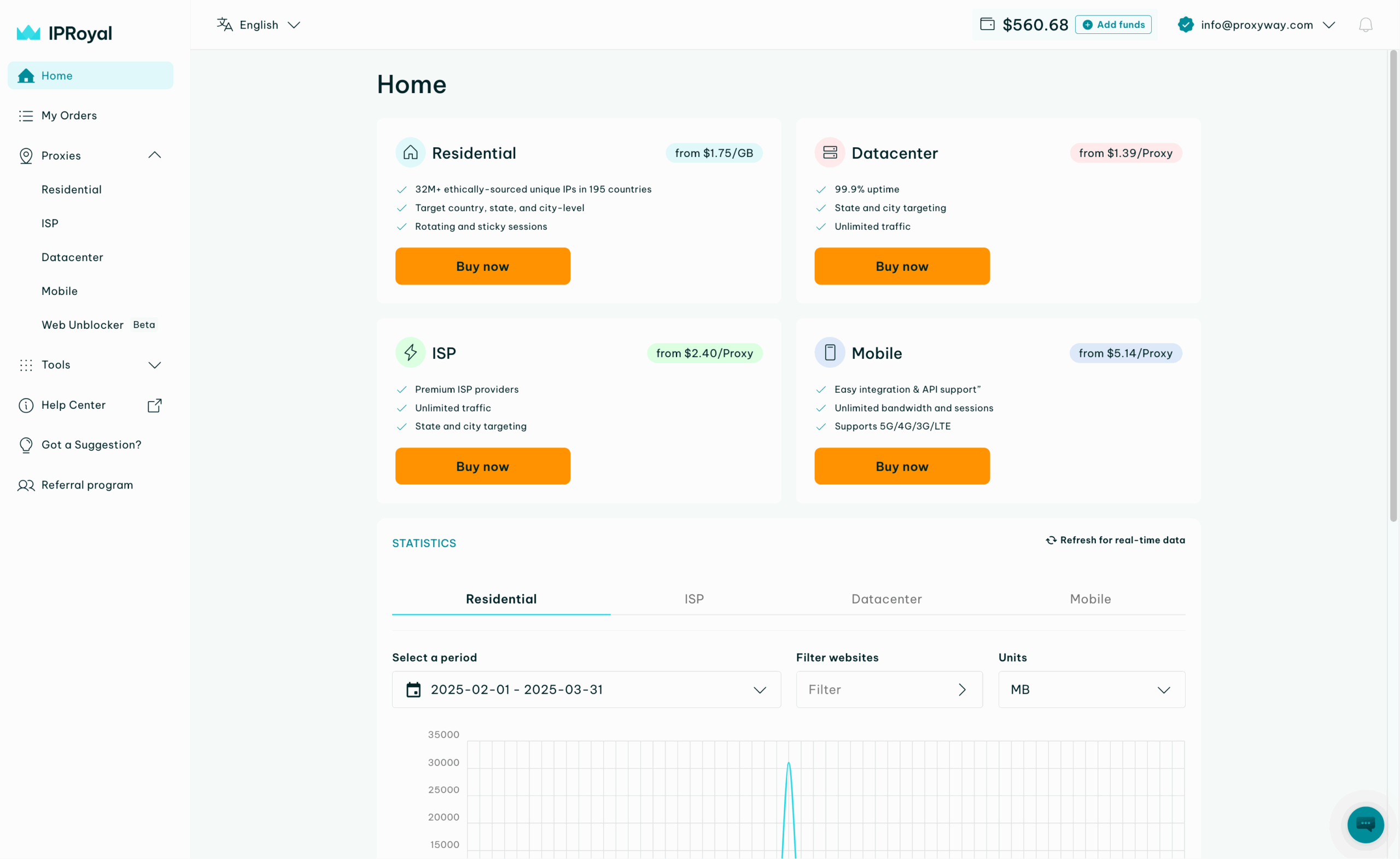
IPRoyal allows buying proxies using two methods. One is to deposit money onto the platform; the second is to create orders directly. The difference is that the former option lets you extend monthly subscriptions or top-up residential traffic without making additional money transfers. In any case, it’s possible to save payment information in the settings.
You can track orders under individual proxy types or a separate page for invoices. The system allows adding a note to an order and then searching for it, which is a nice touch for usability.
IPRoyal protects access with two-factor authentication. It sends a code by email every time you try to log in. In addition, the dashboard allows configuring 2FA with authenticator apps, tracking activity, and logging out devices.
The provider has multiple tools for team access. First, there are dashboard users – for now, without permissions. Second, you can create sub-users for residential proxy access; they have separate credentials, statistics, and traffic allowances.
For regular proxy setup, IPRoyal offers a fully-featured widget. It lets you select location filters, rotation settings, and a create proxy list or copy automatically-generated code samples. With datacenter or ISP proxies, IPRoyal simply displays a list of assigned IPs.
IPRoyal’s residential proxies have a graph that shows traffic expenditure over time. You can freely choose the start and end dates, as well as filter the graph by the websites you accessed.
Alternatively, you can download a data usage report by entering a username, date range, and your preferred data measurement unit. IPRoyal creates a CSV file that shows daily traffic use per target. This isn’t the most convenient reporting format but still better than nothing.
For general information about the service, IPRoyal provides a network status page. It’s actually very granular, showing the health of various infrastructure components.
Finally, you can opt to get automated traffic reminders by email.
API Access
IPRoyal provides API endpoints for each proxy type. They’re fully functional, letting you interact with the account, proxy servers, get location and other information.
The residential proxy API is the most fleshed out, while the mobile endpoint only lets you view remaining balance and rotate an IP.
Documentation
IPRoyal’s documentation has improved a lot throughout the years and can now be considered comprehensive. The provider offers quick-start guides, a YouTube channel, a help center, and a documentation hub. All are well made and shouldn’t leave you wanting for information.
Hands-On Support
IPRoyal answers queries 24/7 via live chat, email, and Discord. We tried contacting the support via live chat; an agent responded within a minute and competently answered as many questions as we threw at them. Color us impressed.
Conclusion
IPRoyal is a strong mid-market option for a wide range of uses. It’s still going through growing pains: the features and user experience are already there, but the proxy pool remains relatively small and seriously abused.
Is IPRoyal the right pick for you? It depends. The residential proxy network should be just fine for small to mid-size use. While it can’t measure up to the premium providers yet, the service is improving fast. And the upsides make a compelling case: non-expiring traffic, and some of the most flexible IP rotation settings we’ve seen.
For enterprises, the situation is tricky. IPRoyal may not have the steam to be the sole supplier, though you can always use it as a secondary choice.
In conclusion, you can surely try IPRoyal for most tasks today, just be aware of the limitations.
IPRoyal Alternatives

Decodo has similar rates, great user experience, and residential proxies that perform better. It’s probably the main alternative that you should consider.
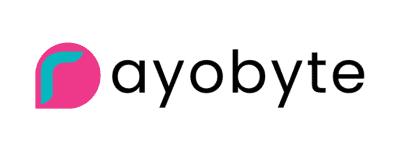
Rayobyte is a strong pick if you need datacenter or ISP proxies. Its residential network performs worse but has attractive pricing and a larger pool.

Bright Data has more features, more flexibility, and it’s one of the top choices overall. Consider it if you found IPRoyal lacking and don’t mind paying more.
Recommended for:
Anyone looking for cheap residential proxies.
Use coupon PROXYWAY30 to get a 30% discount.
